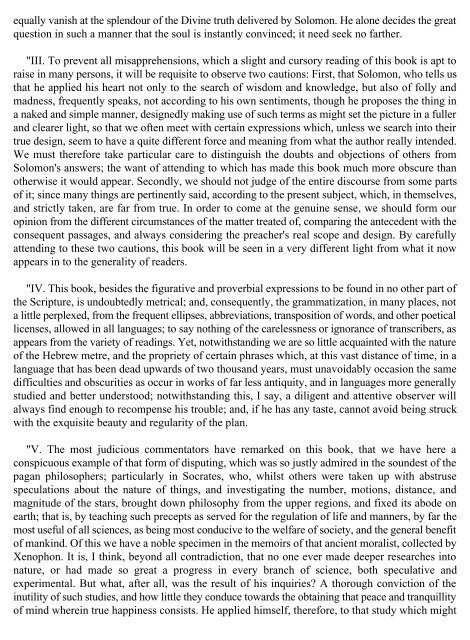Clarke's Commentary - Proverbs - Song Of ... - Media Sabda Org
Clarke's Commentary - Proverbs - Song Of ... - Media Sabda Org
Clarke's Commentary - Proverbs - Song Of ... - Media Sabda Org
Create successful ePaper yourself
Turn your PDF publications into a flip-book with our unique Google optimized e-Paper software.
equally vanish at the splendour of the Divine truth delivered by Solomon. He alone decides the great<br />
question in such a manner that the soul is instantly convinced; it need seek no farther.<br />
"III. To prevent all misapprehensions, which a slight and cursory reading of this book is apt to<br />
raise in many persons, it will be requisite to observe two cautions: First, that Solomon, who tells us<br />
that he applied his heart not only to the search of wisdom and knowledge, but also of folly and<br />
madness, frequently speaks, not according to his own sentiments, though he proposes the thing in<br />
a naked and simple manner, designedly making use of such terms as might set the picture in a fuller<br />
and clearer light, so that we often meet with certain expressions which, unless we search into their<br />
true design, seem to have a quite different force and meaning from what the author really intended.<br />
We must therefore take particular care to distinguish the doubts and objections of others from<br />
Solomon's answers; the want of attending to which has made this book much more obscure than<br />
otherwise it would appear. Secondly, we should not judge of the entire discourse from some parts<br />
of it; since many things are pertinently said, according to the present subject, which, in themselves,<br />
and strictly taken, are far from true. In order to come at the genuine sense, we should form our<br />
opinion from the different circumstances of the matter treated of, comparing the antecedent with the<br />
consequent passages, and always considering the preacher's real scope and design. By carefully<br />
attending to these two cautions, this book will be seen in a very different light from what it now<br />
appears in to the generality of readers.<br />
"IV. This book, besides the figurative and proverbial expressions to be found in no other part of<br />
the Scripture, is undoubtedly metrical; and, consequently, the grammatization, in many places, not<br />
a little perplexed, from the frequent ellipses, abbreviations, transposition of words, and other poetical<br />
licenses, allowed in all languages; to say nothing of the carelessness or ignorance of transcribers, as<br />
appears from the variety of readings. Yet, notwithstanding we are so little acquainted with the nature<br />
of the Hebrew metre, and the propriety of certain phrases which, at this vast distance of time, in a<br />
language that has been dead upwards of two thousand years, must unavoidably occasion the same<br />
difficulties and obscurities as occur in works of far less antiquity, and in languages more generally<br />
studied and better understood; notwithstanding this, I say, a diligent and attentive observer will<br />
always find enough to recompense his trouble; and, if he has any taste, cannot avoid being struck<br />
with the exquisite beauty and regularity of the plan.<br />
"V. The most judicious commentators have remarked on this book, that we have here a<br />
conspicuous example of that form of disputing, which was so justly admired in the soundest of the<br />
pagan philosophers; particularly in Socrates, who, whilst others were taken up with abstruse<br />
speculations about the nature of things, and investigating the number, motions, distance, and<br />
magnitude of the stars, brought down philosophy from the upper regions, and fixed its abode on<br />
earth; that is, by teaching such precepts as served for the regulation of life and manners, by far the<br />
most useful of all sciences, as being most conducive to the welfare of society, and the general benefit<br />
of mankind. <strong>Of</strong> this we have a noble specimen in the memoirs of that ancient moralist, collected by<br />
Xenophon. It is, I think, beyond all contradiction, that no one ever made deeper researches into<br />
nature, or had made so great a progress in every branch of science, both speculative and<br />
experimental. But what, after all, was the result of his inquiries? A thorough conviction of the<br />
inutility of such studies, and how little they conduce towards the obtaining that peace and tranquillity<br />
of mind wherein true happiness consists. He applied himself, therefore, to that study which might
















